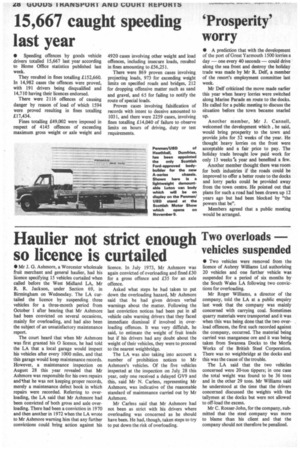Haulier not strict enough Two overloads
Page 30

If you've noticed an error in this article please click here to report it so we can fix it.
so licence is curtailed vehicles suspended • Mr J. G. Ashmore, a Worcester wholesale fruit merchant and general haulier, had his licence specifying 15 vehicles curtailed when called before the West Midland LA, Mr R. R. Jackson, under Section 69, in Birmingham on Wednesday. The LA curtailed the licence by suspending three vehicles for a three-month period from October 1 after hearing that Mr Ashmore had been convicted on several occasions, mainly for overloading, and had also been the subject of an unsatisfactory maintenance report.
The court heard that when Mr Ashmore was first granted his 0 licence, he had told the LA that a local garage would inspect his vehicles after every 1000 miles, and that this garage would keep maintenance records. However, a maintenance inspection on August 28 this year revealed that Mr Ashmore was responsible for his own repairs and "that he was not keeping proper records, merely a maintenance defect book in which repairs were recorded. Referring to overloading, the LA said that Mr Ashmore had been convicted of both gross and axle overloading. There had been a conviction in 1970 and then another in 1972 when the LA wrote to Mr Ashmore warning him that any further convictions could bring action against his licence. In July 1973, Mr Ashmore was again convicted of overloading and fined £30 for a gross offence and £35 for an axle offence.
Asked what steps he had taken to put down the overloading hazard, Mr Ashmore said that he had given drivers verbal warnings about the matter. Following the last conviction notices had been put in all vehicle cabs warning drivers that they faced immediate dismissal if involved in overloading offences. It was very difficult, he said, to estimate the weight of fruit loads but if his drivers had any doubt about the weight of their vehicles, they were to proceed to the nearest weighbridge.
The LA was also taking into account a number of prohibition notices to Mr Aslunore's vehicles. Of the five vehicles inspected at the inspection on July. 28 this year, only one received a delayed GV9 and this, said Mr N. Carless, representing Mr Ashmore, was indicative of the reasonable standard of maintenance carried out by Mr Ashmore.
Mr Carless said that Mr Ashmore had not been as strict with his drivers where overloading was concerned as he should have been. He had, though, taken steps to try to put down the risk of overloading. • Two vehicles were removed from the licence of Aubrey Williams Ltd authorizing 20 vehicles and one further vehicle was suspended for a period of six months by the South Wales LA following two convictions for overloading.
Mr Roger Williams, a director of the company, told the LA at a public enquiry last week that the company was mainly concerned with carrying coal. Sometimes quarry materials were transported and it was when this was being done that the two overload offences, the first such recorded against the company, occurred. The material being carried was manganese ore and it was being taken from Swansea Docks to the Morfa Works of the British Steel Corporation. There was no weighbridge at the docks and this was the cause of the trouble.
The LA said that the two vehicles concerned were 20-ton tippers; in one case the total weight was found to be 36 tons and in the other 29 tons. Mr Williams said he understood at the time that the drivers concerned discussed the weights with the tallymen at the docks but were not allowed to off-load the excess.
Mr C. Rosser-John, for the company, submitted that the steel company was more to blame than his client and that the company should not therefore be penalized.












































































































